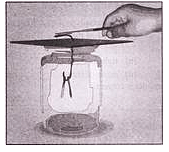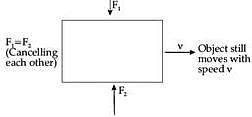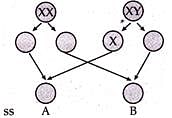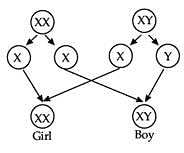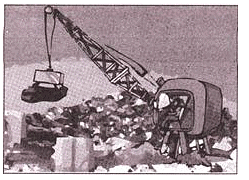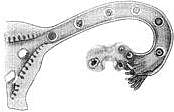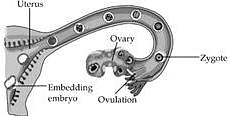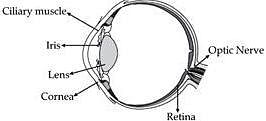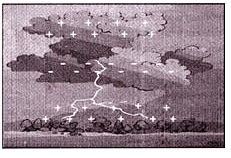Ques 1: Choose the correct option:
(i) Sometimes, manure is added to the soil before tilling because-
(A) less manure is used.
(B) it helps in proper mixing of manure with soil.
(C) it saves labour and time.
(D) none of the above.
Ans: B
Ques 2: Choose the correct option:
(ii) The most common carrier of communicable disease is:
(A) Ant
(B) Housefly
(C) Dragonfly
(D) Spider
Ans: B
Ques 3: Choose the correct option:
(iii) The bread or idli dough rises because of
(A) heat
(B) grinding
(C) growth of yeast cells
(D) kneading
Ans: C
Ques 4: Choose the correct option:
(iv) Nitrogen fixation is brought about by
(A) (a) blue-green algae
(B) (b) bacteria
(C) (c) both (a) and (b)
(D) (d) none of these
Ans: C
Ques 5: Choose the correct option:
(v) The strongest fibre is called
(A) rayon
(B) nylon
(C) acrylic
(D) none of these
Ans: B
Ques 6: Choose the correct option:
(vi) Which of the following statements is correct?
(A) All metals are ductile.
(B) All non-metals are ductile.
(C) Generally, metals are ductile.
(D) All are true.
Ans: C
Ques 7: Choose the correct option:
(vii) Fossil fuels are obtained from:
(A) Remains of non-living materials.
(B) Dead remains of birds only.
(C) Dead remains of insects only.
(D) Dead remains of living organisms.
Ans: D
Ques 8: Choose the correct option:
(viii) The calorific value of a fuel is expressed in a unit called
(A) kilojoule per litre
(B) kilogram per milliliter
(C) kilojoule per gram
(D) kilojoule per kilogram
Ans: D
Ques 9: Choose the correct option:
(ix) Which one of the following changes may occur due to desertification?
(A) Decreases in atmospheric temperature.
(B) Increase in water holding capacity of soil.
(C) Increased chance of floods.
(D) Conversions of fertile land into a desert.
Ans: D
Ques 10: Choose the correct option:
(x) The unit of measurement used for expressing dimension (size) of cells is:
(A) Centimeter
(B) micrometer
(C) Millimeter
(D) metre
Ans: C
Ques 11: (i) What is static electricity?
Ans: (i) The electricity generated by rubbing is called static electricity.
Ques 12: (ii) Name the substance which does not burn with flame.
Ans: (ii) Charcoal
Ques 13: (iii) At what angles are mirrors inclined in a kaleidoscope and a periscope respectively?
Ans: (iii) Kaleidoscope: 60º Periscope: 45º
Ques 14: (iv) Reproduction in which single parent is Required
Ans: (iv) Asexual reproduction.
Ques 15: (v) Which micro-organism is responsible for causing Rust of Wheat?
Ans: (v) Fungi
Ques 16: (vi) Name two water pollutants which are toxic for both plants and animals.
Ans: (vi) Lead (Pb) and Arsenic (As).
Ques 17: What is the difference between stars and planets?
Ans: Difference between Stars and Planets:
S. No.
| Stars
| Planets
|
(i)
| Stars twinkle in the sky.
| They do not twinkle.
|
(ii)
| They are fixed at a point.
| They revolve around the Sun.
|
(iii)
| They have their own light.
| They have no light.
|
(iv)
| They are very big in size.
| They are smaller in comparison to stars.
|
Ques 18: Look at fig. below. Can the image of the child in it be obtained on the screen?

Ans: The image of the child cannot be obtained on the screen because the image is not real. The images formed by plane mirror are virtual, so these virtual images cannot be seen on the screen.
Ques 19: The aluminum strips on an electroscope are replaced by plastic strips and a charged body is brought in contact with the metal clip. What will happen?

Ans: If aluminium strips are replaced by plastic strips, we cannot predict whether the object is charged or not.
Ques 20: A pendulum oscillates 40 times in 4 seconds. Find its time period and frequency.
Ans: Frequency = 40 times Time = 4 seconds Frequency in one second = 40/4 = 10 time Time = 1/Frequency = 1/10 = 0.1 Seconds = 1/Time Period = 1/0.1 = 10
Ques 21: Two boys are riding their bicycle on the same concrete road. One has new tyres on his bicycle while the other has tyres that are old and used. Which of them is more likely to slip while moving through a patch of the road which has lubricating oil spilled over it?
Ans: The boy having the tyres which are old and used is more likely to slip because these tyres will experience less frictional force which is insufficient to move on the oily road.
Ques 22: Two persons are applying forces on two opposite sides of a moving cart. The cart still moves with the same speed in the same direction. What do you infer about the magnitudes and direction of the forces applied.
Ans: The magnitudes of forces are equal and they act in opposite direction so they are cancelling each other.
The following diagram shows this.

Ques 23: Fill in the blank circles in figure and identify the sex of child A and B.

Ans:

Ques 24: Why is acrylic more popular than natural woollen fibres?
Ans: Acrylic is available in a variety of colours, more durable and affordable which makes it more popular than natural woollen fibres.
Ques 25: Classify the following crops into Kharif and Rabi crop and write in the tabular columns given below: Maize, paddy, mustard, pea, gram, wheat, groundnut, cotton.
Ans:
Kharif Crops
| Rabi Crops
|
Maize
| Mustard
|
Paddy
| Pea
|
Groundnut
| Wheat
|
Cotton
| Gram
|
Ques 26: Some natural resources are given below. Classify them into the exhaustible and inexhaustible natural resources. Air, coal, natural gas, sunlight, petroleum, minerals, forests, oxygen.
Ans: Exhaustible Natural Resources: Coal, Natural gas, Petroleum, Minerals, Forests. Inexhaustible Natural Resources: Air, Sunlight, Oxygen
Ans: Exhaustible Natural Resources: Coal, Natural gas, Petroleum, Minerals, Forests. Inexhaustible Natural Resources: Air, Sunlight, Oxygen
Ques 27: How are acids and bases formed?
Ans: Acids: Acids are formed when non-metals react with oxygen and form non-metallic oxides. These oxides when dissolved in water, form acids. e.g.,


Bases: Bases are formed when metals react with oxygen and form metallic oxides. These oxides when dissolved in water, form bases. e.g.


Ques 28: (i) Differentiate between eukaryotes and prokaryotes on the basis of nucleus.
(ii) Give at least 2-2 examples each of eukaryotic and prokaryotic cells.
Ans: (i)
Eukaryotic Cell
| Prokaryotic Cell
|
The cells having well-organised nucleus with nuclear membrane.
| The cells having nuclear material without nuclear membrane.
|
(ii) Examples of Eukaryotic cell: Onion cell and cheek cell
Examples of Prokaryotic cell: Blue green algae and Bacteria
Ques 29: In Delhi, due to bad quality of air, people felt difficulty in breathing and irritation in eyes.
(i) What was the reason of bad condition of air?
(ii) Name the pollutant present in air and other things creating this condition,
Ans: (i) Air pollution was the reason of bad condition of air. The air was contaminated by unwanted substances that had harmful effect on both living and non-living things.
(ii) The air pollutants that contaminated the air were: Smoke, dust, Sulphur dioxide(SOx), Nitrogen dioxide(NOx), particulate matter. The other sources were factories, power plants, automobile exhausts, the burning of various materials like cow dung, fire wood.
Ques 30: Identify the metals and non-metals which are
(i) used in making utensils and machinery parts
(ii) essential for our life, which all living being inhale during respiration
(iii) used in thermometers, present in liquid state.
Ans: (i) Aluminium, Copper
(ii) Oxygen
(iii) Mercury
Ques 31: Although wood has a very high calorific value, we still discourage its use as a fuel. Explain.
Ans: Burning of wood has several disadvantages. These are as follows:
(i) Burning of wood produces a lot of smoke which causes respiratory diseases.
(ii) The cutting down of trees to obtain wood fuel leads to deforestation which is very harmful to the environment
(iii) Trees provide us many useful substances. To obtain fuel wood, when trees are cut down, then all useful substances which can be obtained from trees are lost.
Ques 32: Why pituitary gland is called 'Master Gland'?
Ans: It is called so as it is the most important endocrine gland. Its size is just equal to a small pea. The hormones secreted by pituitary gland stimulate testes and ovaries to secrete their hormones. It also regulates the activity of other endocrine glands.
Ques 33: Fig. shows a car sticking to an electromagnet. Name the forces acting on the car. Which one of them is larger?

Ans: The forces working on the object (car) are
(i) Force of gravity (downwards),
(ii) Magnetic force (upwards).
Since the car is moving upwards, so magnetic force due to electromagnet is greater.
Ques 34: After observing answer the following.

(i) Read the following statements and label them in the figure:
(a) The part which produces female gametes.
(b) The part where development of the baby takes place.
(c) The part through which the developing embryo passes to reach the uterus.
(ii) Explain the future development of the embryo that would take place after it gets embedded in the uterus.
Ans:

(i) (a) Ovary (produces gametes)
(b) Uterus (development of body takes place)
(c) Oviduct (tube through which embryo reaches uterus)
(ii) The embryo continues to develop after it gets embedded in the uterus. It divides and differentiates into three germ layers which give rise to different body parts such as hands, legs, head, eyes, ears etc. This stage where all the body parts are distinct and easily identified in developing embryo is called foetus. After completion of development of foetus, mother gives birth to baby.
Ques 35: (i) Draw a well labelled diagram to show the internal structure of Human Eye.
(ii) Write the function of Iris and Retina.
(iii) How will you take proper care of your eyes? Write any two.
Ans: (i) Human Eye

(ii) Iris: It controls the amount of light entering into the eye through the pupil.
Retina: It is the site of image formation.
(iii) We can take care of our eyes in the following manner:
(a) If advised, use suitable spectacles.
(b) Too little or too much light is bad for eyes. Insufficient light can cause eye strain and headache.
(c) Too much light like that of the sun, a powerful lamp or a laser torch can injure the retina.
Ques 36: (i) What are audible and inaudible sounds? Write the range of audible frequency for human ear.
(ii) Explain in what way noise pollution is harmful for humans.
Ans: (i) Audible sound: 20 Hz to 20,000 Hz is audible for human beings.
This is also called as Sonic Sound.
Inaudible sound:
(a) Sound less than 20 Hz frequency is called infrasonic sound.
(b) Sound more than 20,000 Hz frequency is called ultrasonic sound.
These both are inaudible to human ears.
(ii) Lack of sleep, hypertension (high blood pressure), anxiety and many more health disorder may be caused by noise pollution. Noise pollution also causes the temporary or even permanent deafness in human being.
Ques 37: Explain the mechanism of thunderstorms or story of lightning.

Ans: Mechanism of thunderstorm or the story of lightning: During the development of a thunderstorm, the air current moves upwards, while the water droplets move downwards. These vigorous movements can cause separation of charges. By a process, the positive charges collect near the upper edges of the clouds and the negative charges accumulate near the lower edges.
There is accumulation of the charges near the ground also. When the magnitude of accumulated charges becomes very large, negative and positive charges meet. It produces streaks of light and sound. This process is called electric discharge.

